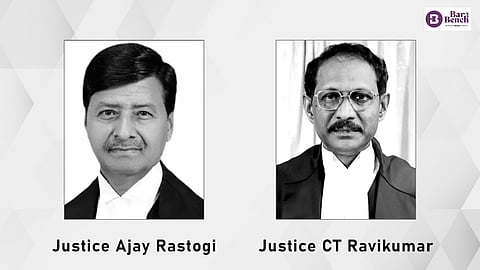
- News
- Columns
- Interviews
- Law Firms
- Apprentice Lawyer
- Legal Jobs
- हिंदी
- ಕನ್ನಡ

The Supreme Court on Wednesday observed that the failure to report cases of sexual offences against children is a serious crime and is often done to shield offenders. (State of Maharashtra and anr v. Dr Maroti)
A Bench of Justices Ajay Rastogi and CT Ravikumar took a dim view of the Bombay High Court quashing a First Information Report (FIR) and chargesheet in a case relating to the unreported sexual abuse of 17 minor tribal girls, even when a prima facie case was made out against the accused. It held,
"...non-reporting of sexual assault against a minor child despite knowledge is a serious crime and more often than not, it is an attempt to shield the offenders of the crime of sexual assault."
The Court noted that Sections 19(1) and 21 of the Protection of Children from Sexual Offences (POCSO) Act provide for those not informing authorities of such offences to be prosecuted. In this regard, it said,
"Certainly, such provisions are included in with a view to ensure strict compliance of the provisions under the POCSO Act and thereby to ensure that the tender age of children is not being abused and their childhood and youth is protected against exploitation."
The case arose from a 2019 criminal complaint filed for offences under the POCSO Act allegedly committed against minor tribal girls at Rajura town in Maharashtra's Chandrapur district.
The hostel superintendent of the school where the girls studied was the prime accused. One of the school's doctors was also made accused after it was found that the survivors had approached him after the incidents, but he had not acted on the same.
The Nagpur Bench of the High Court, however, quashed the proceedings against the doctor after observing that there was no evidence to implicate him in the crime. It relied on statements of other witnesses and an analysis of the proof mentioned in the chargesheet. The State then moved the Supreme Court in appeal.
The top court at the outset observed that it was 'pained' with the order under challenge, as a legitimate prosecution under the POCSO Act had been 'throttled at the threshold'. This was done without permitting the materials in support of it to see the light of the day, the judges stated.
The Bench noted that a legal obligation is cast upon relevant authorities to report offences under the POCSO Act.
"Such obligation is also bestowed on person who has apprehension that an offence under this Act is likely to be committed," the judgment stated.
The Court explained how reporting such offences helps nab the culprit and have their medical examination done promptly.
"...a prompt reporting of the commission of an offence under POCSO Act would enable immediate examination of the victim concerned and at the same time, if it was committed by an unknown person, it would also enable the investigating agency to commence investigation without wasting time and ultimately to secure the arrest and medical examination of the culprit. There can be no two views that in relation to sexual offences medical evidence has much corroborative value."
The Bench also touched upon how, if the investigating officer's final report made out a prima facie case, the truthfulness, sufficiency or admissibility of evidence are not subject to review by the High Court. Rather, it is for the trial court to do the same.
The judgment noted that the High Court was not justified in bringing to an 'abrupt termination' the proceedings against the respondent in case, and allowed the appeals. Noting that such an exercise resulted in miscarriage of justice, the Court held,
"In the case on hand, the High Court arrived at the finding of absence of evidence to implicate the respondent in the crime in question upon going through the statements of the victims and also the statement of the teacher of the victims, which recourse is absolutely impermissible."
Advocates Sanjay Kharde, Siddharth Dharmadhikari, and Aaditya Aniruddha Pande appeared for the petitioners.
Senior Advocate Anil Mardikar with Advocate Sachin Shanmukham Pujari appeared for the respondents.
[Read judgment]